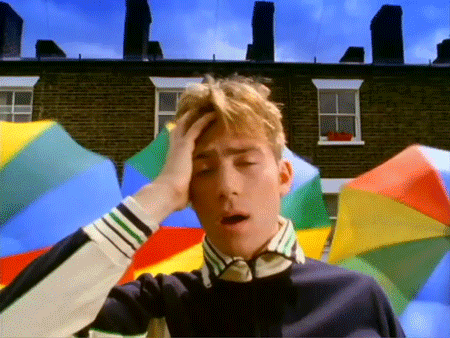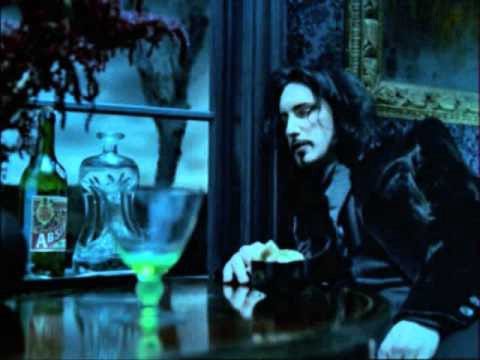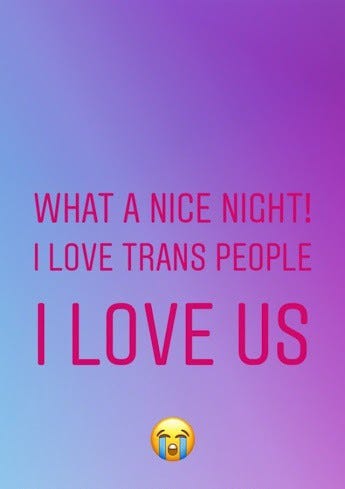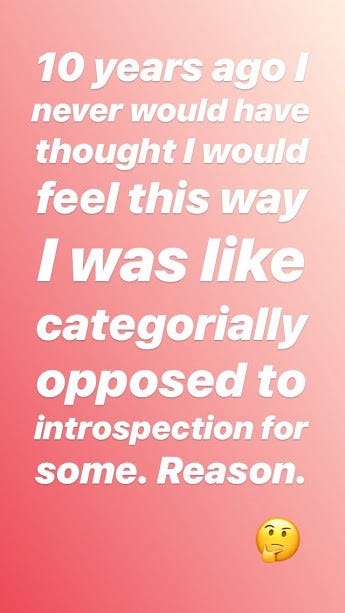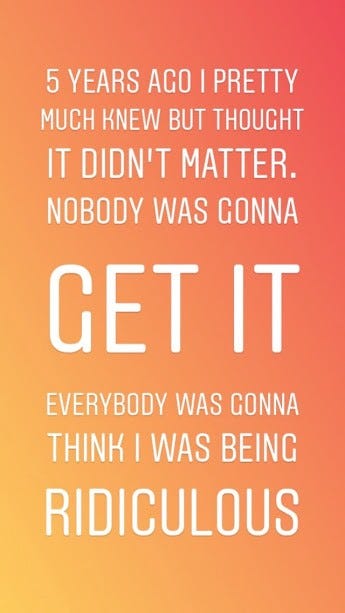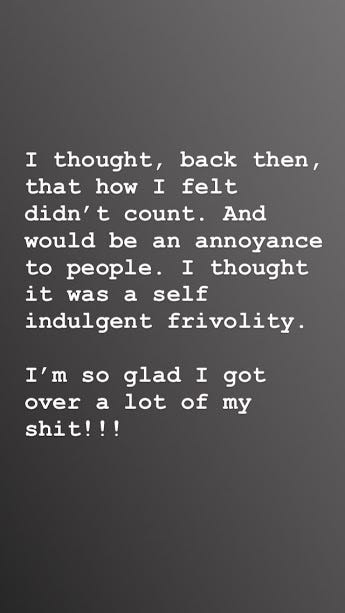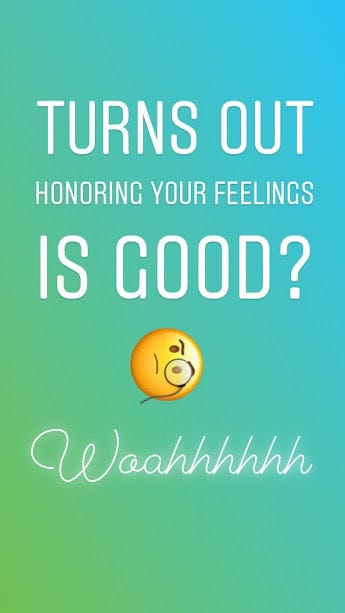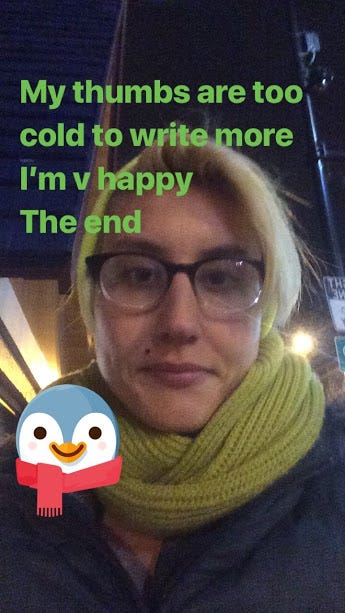A Personal Account of Trans Doubts
TW: Eating Disorder, Transphobia
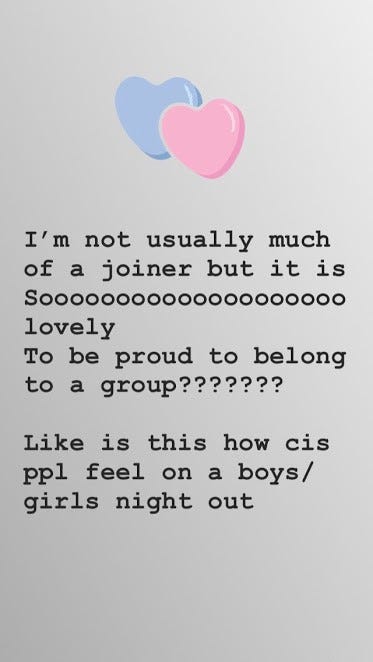
The first time I knew a trans person, I was in high school. He was a trans guy, about my age, and we had been friends for years. We became closer friends after he came out. We spent time drinking on his roof. I tried on his binder, wore men’s clothing with him. He drew a mustache on my face. We went to Rocky Horror Picture Show together in “drag” — me dressed as a boy, him as a girl.
I drove him to trans support group meetings. When a trans guy friend of his from Myspace came to visit, I hung out with the two of them all week long, wandering around town for hours, just talking, buying snacks at Walgreens and drinking Vitamin Water in the kitchen. I felt at home with both of them.
He and I talked about gender stuff sometimes. His therapy, his transition plans, his dad. How ignorant people could be. When people called him she, I corrected them. I didn’t understand why it was so difficult to get right. He and I went to a Dresden Dolls concert together, cosplaying, for no clear or relevant reason, as country boys. I had the name Jebediah written on my arm, he had some other kind of old-timey, provincial man’s name written on his. I can’t remember what it was. We loved the songs by Amanda Palmer that dealt with gender dysphoria, body image issues, transformation. He and I were both trying to starve ourselves down to more angular, androgynous shapes.
In all the time he and I spent together, I never consciously considered that I might be trans. It never ever crossed my mind. I don’t know if he had inklings about me. He never said a thing
It’s been well over a decade, and now I know I’m trans, but I can’t help but wonder if taking this long to figure it out makes me a gigantic fraud. I’ve known a lot of trans people across my life, almost always gravitated towards them (often without realizing it). But I wasn’t outspoken about my trans feelings until very very recently. I can’t help but feel like every other trans person in the universe is legitimate, and worth of respect, but that I am a faker and demanding delusional baby.
— — — —
During that same period of my life, I was obsessively watching Nine Inch Nails and Blur music videos every evening, studying Trent Reznor and Damon Albarn’s faces intently. I told everyone I was asexual, but I couldn’t stop staring at the faces of beautiful, kind of androgynous men and feeling deep longing.
It wasn’t solely that I found these guys attractive; I wanted to be like them. I started wearing eyeliner below my eyes, because Damon did in the video for The Universal. I bought a blue and green track jacket that reminded me of the one he wore in the video for Parklife. I looked at the narrow, prominent hipbones of his cartoon alter ego, 2D, and yearned to have them for myself. I watched Trent Reznor writhe around in water in the video for The Perfect Drug, pining for his bony, fuzzy chest, but not knowing in what way. Did I want to touch it, did I want to have it? I didn’t know. I just couldn’t look away.
I was fascinated with these guys, wanted to emulate them in every single way, and was taking drastic steps to change my body to resemble theirs. I lost my period for about two months, so deeply did I want to whittle myself down to their size. I took selfies for Myspace that played up the size my chin; I squinted at the camera in a way that I now recognize as a bit masculine, but there was nothing conscious in it at the time. I did not ever ask myself if any of it meant I was trans. I didn’t ask myself what it meant at all.
— — — —
The truth flew out of me once, in college. It was 2007 and I was living with a friend I’d known for years. We were sitting in the cramped living room of our apartment, talking about politics.
He said something about Hillary Clinton. He was active in her campaign, and had been a supporter of hers for years and years. I said something dismissive, and probably flat-out rude, about not liking Hillary Clinton at all. He had to put up with a lot of that, even then. I’m sure it must have been irritating.
He asked me, “Don’t you, as a woman, feel some feminist obligation to-“
“I don’t…identify as a woman,” I told him. It just came out. It wasn’t something I’d thought about much. Not something I had needed to think about. I just knew it was true. I thought everybody went around not feeling like the gender they were, just slowly trudging along with the role that they had been assigned.
He sighed. He was frustrated. He said that people saw me as a woman, and treated me like one, and I experienced sexism, and so I should feel some solidarity with women. Which all seemed like a fair observation. I didn’t know, yet, that things could be any more complicated than that. That my life experience wasn’t fully that of a woman, even back when I was still ostensibly living as one.
Instead of pushing back, I took his words to heart. For years afterward, I’d hear his words, bracing me, whenever I contemplated coming out as nonbinary, or sharing with somebody that I didn’t feel like a woman. When I accumulated “womanly” experiences like being sexually assaulted, I burrowed even deeper into myself. I told myself I couldn’t be a man or a nonbinary person, I had all these female experiences. I had a responsibility to feel some solidarity with women because of it.
And so I kept on like that, for many years, living as some woman who didn’t feel like one, but who had all the supposed experiences of one. I trudged along in the role I had been assigned. And I thought there was no better feeling alternative.
— — — —
I knew trans people throughout all of college. I saw people come out, start hormones, get surgery, use they/them or zie/zim pronouns, figure things out. I had friends whom I suspected were trans, but who didn’t fully know it about themselves yet. I had a boyfriend who asked me if I was trans, seemingly out of nowhere, emphatic that he would still love me if I was. He was weirdly demanding and frantic in his asking. I told him that I wasn’t. I didn’t understand where he was coming from. I still don’t know what he saw or felt that made him ask.
I had many opportunities to ask myself if I was trans back then, but I never did. I looked into myself very little, really. I thought of myself as a rational person. I wanted to be relatively emotionless and invulnerable. I had academic and career goals that I prioritized over nearly everything else. I was in a messy relationship with a straight guy, and was terrified by the prospect of losing him. I was mourning the death of my father but trying not to think about it. Being trans, like so many other things, seemed unnecessary to consider. A frivolous thing to worry about.
— — — —
Throughout college and graduate school, I started watching a lot of Youtube videos by trans people. I followed some trans blogs, too. I absorbed all kinds of information about what being trans was like. I was fascinated, but it didn’t really feel puerile or fetishistic. I told myself, I guess, that it was important to learn about the needs and experiences of a marginalized group of people. Better to educate myself than to frustrate trans friends with ignorant questions.
Sometimes, listening to the experiences of trans men felt too intense. It felt like I had to look away from it. It felt too intense and profound. I found it was easier to listen to trans women talking about their lives. I could relate to their feelings of dysphoria, but the specifics didn’t match up with mine. Plus it was comforting to imagine some people actually really did find joy in being women. I still did not consider that these feelings might say anything about me.
— — — —
In grad school, I started posting a lot of writing online. Mostly science fiction. All the stories were about disembodied people. The minds of the deceased, uploaded into computers or into the cloud. Consciousnesses raised from corpses, left without comfortable corporeal forms to inhabit. Robots who thought they were humans, but whose bodies betrayed them. The feeling of being uncanny, distant, and out of control of one’s body was pervasive in all of it. Some characters were explicitly trans, but that was a separate matter; when I wrote about robots who didn’t know they were robots, it was not a metaphor for being trans. And yet it was. And yet it wasn’t. I had no idea about myself, still.
Online, I made friends with a lot of writers and editors. We exchanged drafts; I published pieces in their magazines. Sometimes I’d lose touch with a person, and then find them again, years later, and discover they were now out as trans. It has happened several times like that, over the years. I hadn’t taken an interest in these people because I though that they were trans. Transness was never an explicit feature of their fiction. But, quietly, we’d found one another, before we even knew who we were.
Though I felt an immense kinship with these trans writer friends, I also found their identities threatening. It seemed to me that there was a finite and small number of transgender people existing in the world. The more trans people I came to know, the more likely it seemed that I was the delusional one. I really thought my problems and feelings could not be both common and true at the same time.
Any time a friend or acquaintance came out as trans, I feared that I had stolen the idea of being trans from them. That now it was too late for me to ever speak out. That they would think I was an imitator and a freak. That cis people would think I was a bandwagon jumper and a joiner, but also, somehow, an attention seeking special snowflake.
— — — —
I started writing about myself. All kinds of memories rose from the ether — a lot having to do with grief over my dead dad. But other things too. Memories of how getting my first period felt. Reminders of how intensely, as a child, I loathed the idea of someday becoming pregnant. A moment from health class in high school, when the room was divided up into boys and girls, one gender on each side of the room. I had refused to go to my assigned side. I’d lingered in the empty center of the room. I hadn’t meant anything specific by it. I had just felt compelled.
A few people messaged me about these autobiographical, super-short essays. They told me it was beautiful to see me discovering myself. One of them, an older male poet whom I really admired, told me to keep going, to keep coming into myself. He didn’t tell me where I would end up, but he was certain that I was heading someplace profound. To this day, he quietly likes every post I ever make about transitional steps — binders, pronouns, names, finding community.
— — — —
I started using they/them pronouns in author bios and social media profiles around 2015. I had work published in an explicitly trans-only magazine in early 2016. Slowly, I told internet friends that I was nonbinary, maybe leaning a bit transmasculine, and dabbled with new names and considered changing my appearance. Every step felt good. But I was always terrified of going further. I always felt like I was being too demanding, self-absorbed, and noisy about it all. The idea of being annoying seemed intolerable.
It took months and months before I told my partner I was trans, then several more months more until I told my real-life friends. I didn’t tell my family for another year after that. It took half a year of refreshing the website for a local Genderqueer Group before I decided I was ready to attend. I’m envious of the trans people I know who come out the closet at breakneck speed, running with confidence toward the truth, but I am not like them. Sometimes it takes years for me to realize how I feel or what I want. And then, once I realize it, it takes me another year to gather up the courage.
I still have so far to go. I’m still not good at correcting people who call me she. I still lug myself into women’s bathrooms, feeling like my comfort comes second to that of cis people. There are conversations I still haven’t had, that I really need to have, about who I am and how people need to speak about me. I know trans people who are adamant, outspoken, and consistent. But I do not have their courage. This lack of confidence convinces me, sometimes, that I must be making it all up. Or that it would be better for me to forget it all.
— — — —
I get deeply disappointed in myself sometimes, for not knowing myself sooner, not coming out as soon as I knew, not fighting to be recognized, for not having the wherewithal to push back when people ask questions. I feel like a fraud for only coming out in the era of the Transgender Tipping Point, when so many people are visible, and when a lot of us are being accused of being bandwagon jumpers. I hate how it makes me look to cis people. I hate that there is no winning— come out too soon and you’re just trying to be special; come out too late and you’re a transtrender. I hate that I care what they think.
I had hints that I was trans for years. I knew trans people. I was alive and conscious during an era of massive gains to LGBTQ rights. I could have done it. I could have realized, and been out and brash. I could have lead the charge. I could have been a lot more at ease.
But I didn’t. I didn’t even think about it. I thought it was preposterous for me to be self-involved enough to contemplate it. It seemed like something a person was meant to ignore. I thought I could live a whole lifetime being mistaken for a woman and just cruising along through it. I figured that if I was really trans, I would have known in childhood, and that I would have asserted it loudly, with defiance. Something. Just. Anything. But I didn’t have that confidence. I lacked that introspection. And for years I’ve held onto that, and taken it for a sign that all my feelings are fake.
I find myself wishing I didn’t want this, that I could just un-know that I’m trans, that my feelings would dissolve like a children’s Tylenol on my tongue and never impact my relationships or life ever again. And then I try to make myself more confident. And I try to get over my angst. Because cis people get annoyed when you talk about it too much.
— — — —
I don’t think any trans person ever deserves to feel like a fraud. I think if you feel that you are trans or nonbinary in your heart, you’ve already done enough to convince me or anybody else. I want to hear how you want to be described. I want to know your name. I think it’s okay for you to change it a dozen times if you need to. I want to hear all about how you feel. And I believe in all of it. And I don’t think it’s frivilous or annoying or too complicated for anyone to grok.
I don’t scrutinize people who enter trans spaces. I always accept at face value that they are who they say they are, that they know themselves best. I do not find it hard to use a person’s pronouns. I don’t think any trans person has to change the way they speak, or dress, or hold themselves in order to “pass”. I don’t think they need hormones or surgery if they don’t want it. They don’t need to convince me that they count.
I have never thought a single trans person was faking it, or doing it for attention, other than myself.
And furthermore, I believe that if a once-trans-identified person realizes that they are not trans, that it is not a bad thing. Detransitioned people deserve the support and resources they received. They belong in the community if they want to be in it. They deserve to be heard and cared for. They still, by being out and existing, helped educate other people. They worked to make the world a more tolerant place. Their existence and the sharing of their stories helps other detransitioned people, too. Their lives have helped to challenge pernicious gender norms and stereotypes of the trans experience. And they’re beautiful and worthy. And their experience is not a shame, a waste, an error, or a fakery.
The only exception to all this is me. Clearly, I am a liar and an attention-seeking, and I’m deluded as well, and I will regret all of this, even though I want it so badly, and even though I’ve been thinking about and writing about it for years, I’m definitely making it all up. And obviously I need to shut up about it. And one day I will realize I was wrong. And when I realize that I was wrong, I will also come to see that I did irreparable harm to society by speaking my truth.
— — — —
I have spent a lifetime feeling like I need to be quiet and stop having such oversized feelings. I was never taught to talk about my feelings, in general. The world around me is still, largely, hostile to how I feel and who I am, even if I have plenty of individual friends who are not. Overcoming all this resistance is massively difficult. I’m not tough. I’m slow and timid.
I wish I could just listen to one really upbeat, affirming pop song and then never take anybody else’s shit ever again. I keep going to Genderqueer Group meetings hoping that the next session will be the one that locks my confidence in place. When I’m alone, I know who I am, but I shatter around anyone else. I try to stand tall. I say persuasive, confident things online, sometimes. Everywhere else, I feel cowardly and insecure and weak.
No trans person deserves to feel like this. Not even me.
Trans people are good. They’re right about who they are. They don’t have to prove their identity to anyone. They deserve to come out the very moment that they want to. They have every right to spend time thinking about, talking about, and writing about who they are. And I know in my heart that I’m one of them, and that who I am is not called into question by the presence of doubt.




